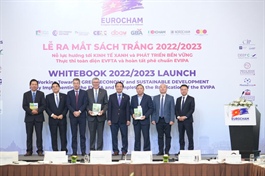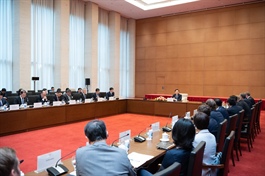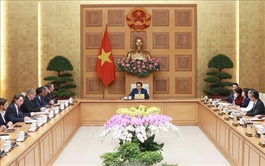Circular economy gains momentum back home
Circular economy gains momentum back home
The circular economy has begun to gain traction in Viet Nam for its potential to optimise resource use, stabilise supply, and offer competitive advantage opportunities for businesses.

Pham Minh Thien, general director of Thanh Binh Company Ltd, revealed that his company's production process had been designed so that waste in one stage becomes fodder for another.
He said his company had bought land in the Tan Hong region to grow a particular strain of rice, which can easily do without fertilisers, pesticides, and crop care. As such, the strain causes a minimal impact on the environment.
At harvest time, its straw is reused as a medium to grow mushrooms whereas its rice husk as a biomass fuel for export. Its rice bran is processed to produce bran oil and animal feed. The residue from this oil-making process is reclaimed to feed poultry.
"The global demand for these by-products is considerable. For instance, bran oil has become much sought after by Japanese traders," said Thien.
The circular economy embraced by Thanh Binh Company Ltd has proved to be highly beneficial to its stakeholders, not only economically but also environmentally.
As a result of the sustainable farming practices, the soil cultivated by the company, which was contaminated previously by chemical substances, has been gradually improving in quality.
Nestle Viet Nam Company Ltd is another name that has managed to incorporate the circular economy into its production.
The company has put coffee grounds to good use by turning them into biomass, which is used to fuel its boilers. The ash left after the combustion will serve as a raw material for the production of bricks.
Coffee sludge is processed into microbial fertilisers to enrich the soil, whereas the steam from the boilers goes to the cooling towers for further reuse. Even the wastewater is not wasted: it will be recycled into A-standard clean water to close the production loop.
Tran Thi Hong Minh, head of the Central Institute for Economic Management, asserted that the circular economy would serve businesses well by enabling the efficient use of resources and facilitating their deeper involvement in the global supply chains.
She said the circular economy is no longer an option but an imperative for businesses because global customers have become more eco-conscious and willing to shift toward a more sustainable buying behaviour.
Vu Kim Hanh, chairman of the Association of Vietnamese High-quality Products, opined that the Government needs to take active steps to lay the groundwork for a broad-based transition to the circular economy.
The to-do list should comprise a long-term scheme for the transition and the entry into force of a sufficient number of legal documents that regulate the notion.
She also said the feasibility of the circular economy in the country would hinge on technological, institutional, infrastructural, and human resources factors.
Nguyen The Chinh, director of the Environmental Economic Policy Institute, underlined several obstacles in the way of businesses trying to embrace the transition.
The first obstacle involves advanced technology, which is not always readily accessible to a large number of businesses. Without advanced technology at their disposal, many businesses get stuck in their traditional linear way of production.
The second obstacle centres around the rigidity of domestic consumption habits. For instance, a wide range of consumers back home keep using plastic bags for their convenience and show a reluctance to shift gears, posing a setback for recyclable bags.























